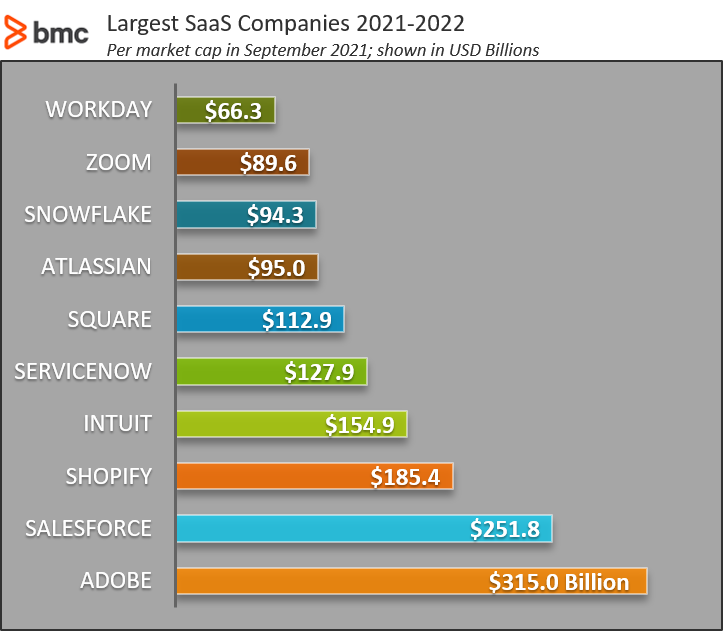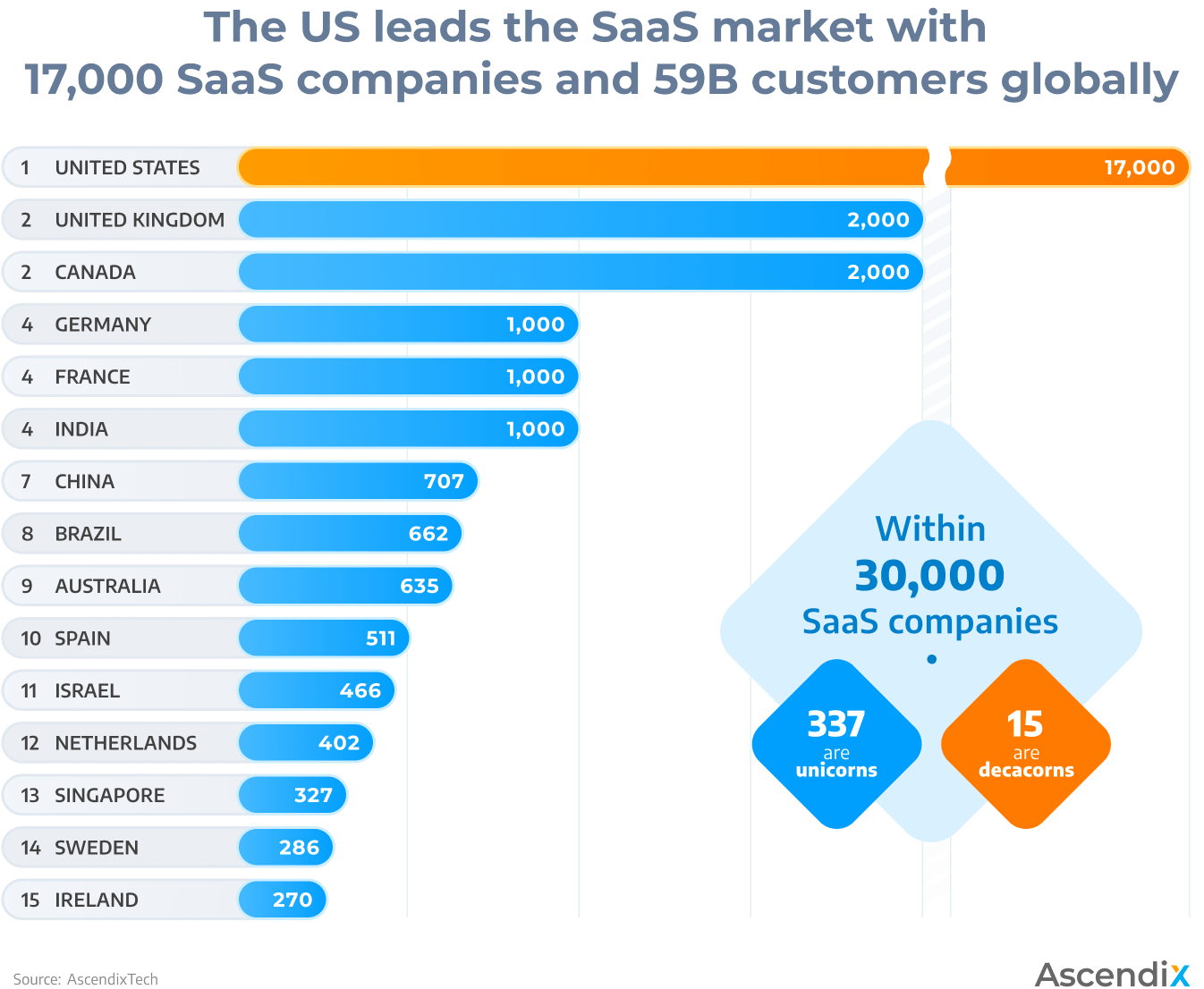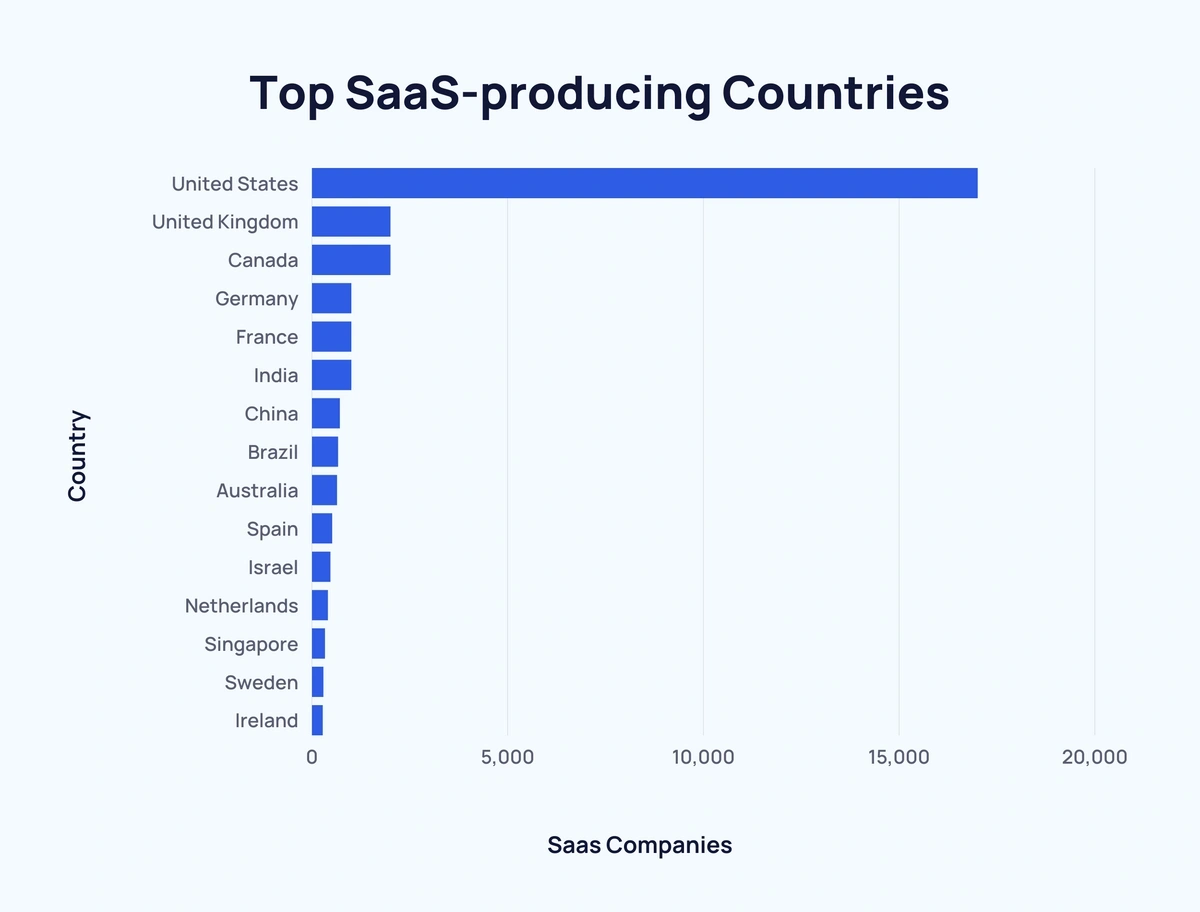So you’re probably wondering, what exactly is the biggest market for Software-as-a-Service (SaaS)? Well, in this article, we’re going to take a closer look at where the demand for SaaS solutions is highest, and what factors contribute to this thriving market. From the rise of cloud computing to the increasing need for remote work capabilities, the SaaS industry has experienced explosive growth in recent years. By the end of this article, you’ll have a better understanding of which market is leading the way in the world of SaaS. The biggest market for Software-as-a-Service (SaaS) can be found across various sectors in the economy. From government organizations to small businesses, SaaS has become an integral part of operations and is driving innovation and efficiency. Let’s explore the different sectors and examine how SaaS is being utilized.

This image is property of ascendixtech.com.
Public Sector
Government organizations
Government organizations at all levels, including federal, state, and local, are increasingly adopting SaaS solutions to streamline their operations and enhance service delivery. SaaS offers cost-effective and scalable software solutions that eliminate the need for extensive infrastructure investments. Government agencies use SaaS for various purposes such as human resources management, financial management, document management, and citizen engagement platforms.
Education institutions
In the education sector, SaaS plays a vital role in improving administrative efficiency, supporting remote learning, and enhancing collaboration among educators and students. Educational institutions use SaaS applications for tasks like student information systems, learning management systems, and online assessment platforms. The flexibility and accessibility of SaaS make it an ideal fit for meeting the evolving needs of the education sector.
Healthcare sector
The healthcare industry has also embraced SaaS to streamline patient management, improve clinical outcomes, and enhance communication among healthcare professionals. SaaS solutions enable healthcare organizations to securely store and share patient data, manage electronic health records, and facilitate telemedicine services. This technology has the potential to revolutionize healthcare delivery and improve patient experiences.
Enterprise
Large corporations
Large corporations across various industries rely on SaaS solutions to enhance their operations, improve productivity, and drive innovation. SaaS provides these organizations with the ability to access cutting-edge software without the need for large upfront investments. Large corporations often use SaaS for enterprise resource planning (ERP), customer relationship management (CRM), and supply chain management (SCM) systems.
Mid-sized companies
Mid-sized companies have also recognized the benefits of SaaS and are adopting it to stay competitive in the market. SaaS enables mid-sized companies to access feature-rich software applications at a fraction of the cost of traditional software licensing. These organizations leverage SaaS for functions like project management, collaboration tools, and sales and marketing automation.
Small businesses
SaaS has leveled the playing field for small businesses, giving them access to sophisticated software tools that were previously only affordable for larger enterprises. Small businesses embrace SaaS for tasks such as accounting, payroll management, customer support, and social media marketing. The scalability of SaaS allows small businesses to easily adapt to changing demands and grow their operations without significant IT investments.

This image is property of ascendixtech.com.
Finance
Banking industry
In the banking industry, SaaS solutions are reshaping how financial institutions operate and serve their customers. SaaS applications are used for functions such as online banking, customer relationship management, anti-money laundering, and risk management. The agility and cost-effectiveness of SaaS enable banks to rapidly innovate and deliver personalized services to their customers.
Insurance sector
The insurance sector benefits from SaaS solutions by improving operational efficiency and enhancing customer experiences. SaaS applications are used for tasks like policy administration, claims management, underwriting, and customer relationship management. By leveraging SaaS, insurance companies can streamline their processes, reduce costs, and offer personalized insurance products to their clients.
Financial services
SaaS has also found its way into the broader financial services industry. FinTech startups and established financial services providers utilize SaaS for functions such as wealth management platforms, financial planning tools, payment gateways, and compliance management. SaaS enables financial services companies to stay agile and quickly adapt to the evolving needs of their clients and the regulatory environment.
Retail
E-commerce
The e-commerce industry heavily relies on SaaS for its growth and success. SaaS platforms offer online retailers the necessary tools to manage their websites, inventory, customer data, and online payments. With SaaS, e-commerce businesses can scale easily, optimize their operations, analyze customer behavior, and provide personalized shopping experiences.
Brick-and-mortar stores
Even traditional brick-and-mortar stores are embracing SaaS to stay competitive in the digital age. SaaS solutions help these retailers with tasks like point-of-sale systems, inventory management, customer relationship management, and analytics. The integration of SaaS into their operations allows brick-and-mortar stores to bridge the gap between physical and online channels and offer seamless shopping experiences.
Supply chain management
SaaS plays a significant role in supply chain management, enabling retailers to optimize their logistics processes, track inventory, and collaborate with suppliers and distributors. SaaS solutions help retailers streamline their supply chains, reduce costs, and improve overall efficiency. With real-time visibility into their supply chains, retailers can minimize stockouts, optimize routes, and ensure timely deliveries to their customers.

This image is property of s7280.pcdn.co.
Technology
IT companies
SaaS is widely adopted within the IT industry itself. IT companies use SaaS for various purposes such as project management, bug tracking, code repositories, and collaboration tools. SaaS allows IT companies to focus on developing innovative software solutions while relying on third-party SaaS providers for their internal operational needs.
Software development firms
Software development firms leverage SaaS tools to enhance their development processes, increase efficiency, and collaborate effectively within their teams. SaaS solutions for software development include version control systems, code editors, project management tools, and continuous integration and deployment platforms. These tools empower software development firms to deliver high-quality products faster and with fewer errors.
Telecommunication industry
The telecommunication industry relies on SaaS to improve network management, customer support, and product development. SaaS applications are used for functions such as customer relationship management, billing systems, network monitoring, and data analytics. SaaS enables telecommunication companies to scale their operations, improve customer satisfaction, and rapidly introduce new services to the market.
Manufacturing
Automotive sector
SaaS solutions are transforming the automotive sector by optimizing production processes, improving supply chain visibility, and enhancing quality control. Automotive manufacturers utilize SaaS for tasks such as enterprise resource planning, inventory management, product lifecycle management, and predictive maintenance. SaaS enables manufacturers to streamline their operations, reduce costs, and increase overall efficiency.
Consumer goods
SaaS plays a crucial role in the consumer goods industry by enabling manufacturers to manage their production, distribution, and sales operations more effectively. SaaS solutions are used for tasks like demand planning, order management, inventory optimization, and trade promotions management. With SaaS, consumer goods manufacturers can improve their supply chain responsiveness, reduce stockouts, and maximize sales.
Industrial equipment
SaaS solutions are also utilized in the industrial equipment sector to optimize maintenance, manage assets, and improve operational efficiency. SaaS applications for industrial equipment include asset management systems, predictive maintenance tools, and field service management platforms. By leveraging SaaS, manufacturers can minimize downtime, extend the lifespan of their equipment, and enhance customer satisfaction.
This image is property of cdn.buttercms.com.
Media and Entertainment
Streaming services
Streaming services have disrupted the traditional media landscape, and SaaS is a key enabler of their success. SaaS platforms provide streaming services with the necessary infrastructure, content management systems, and analytics tools to deliver high-quality streaming experiences to their subscribers. The scalability and cost-effectiveness of SaaS make it an ideal choice for streaming service providers.
Digital content platforms
Digital content platforms, such as online publishing and video-sharing platforms, rely on SaaS to manage their content, support user interactions, and generate revenue. SaaS solutions for digital content platforms include content management systems, video hosting platforms, and advertising management tools. With SaaS, digital content platforms can focus on creating compelling content while leaving the technical aspects to SaaS providers.
Gaming industry
The gaming industry has embraced SaaS to enhance game development, distribution, and monetization. SaaS solutions for the gaming industry include game engines, cloud computing platforms, and analytics tools. These tools allow game developers to create immersive experiences, distribute games across multiple platforms, and analyze user behavior to optimize monetization strategies.
Health and Wellness
Fitness apps
SaaS has revolutionized the health and wellness industry by empowering individuals to track their fitness progress and access personalized workout plans. Fitness apps leverage SaaS to provide users with workout routines, dietary recommendations, progress tracking, and community support. By utilizing SaaS, fitness app developers can focus on creating engaging content while relying on scalable infrastructure and user data management.
Healthcare platforms
Healthcare platforms, such as virtual clinics and telehealth services, rely on SaaS to connect patients with healthcare professionals and facilitate remote consultations. SaaS solutions for healthcare platforms include electronic medical record systems, appointment scheduling tools, and video conferencing platforms. SaaS enables healthcare platforms to deliver accessible and convenient care to patients while ensuring data security and regulatory compliance.
Wellness services
Wellness services, such as mental health apps and nutrition coaching platforms, utilize SaaS to provide individuals with personalized wellness plans, self-care tools, and access to professional wellness providers. SaaS solutions for wellness services include wellness management platforms, mindfulness apps, and activity tracking tools. With SaaS, wellness service providers can effectively support individuals in their journey towards better health and well-being.

This image is property of financesonline.com.
Transportation and Logistics
Freight and shipping companies
Freight and shipping companies leverage SaaS solutions to optimize their logistics operations, track shipments, and enhance customer visibility and satisfaction. SaaS applications for freight and shipping include transportation management systems, route planning tools, and real-time tracking platforms. With SaaS, freight and shipping companies can improve operational efficiency, reduce costs, and provide reliable delivery services.
Logistics providers
Logistics providers utilize SaaS to manage their complex supply chain networks, optimize warehouse operations, and track inventory in real-time. SaaS solutions for logistics providers include warehouse management systems, order fulfillment platforms, and inventory tracking tools. With SaaS, logistics providers can improve inventory accuracy, minimize stockouts, and provide timely delivery services to their clients.
Transportation networks
SaaS plays a vital role in managing transportation networks, such as ride-hailing services and public transportation systems. SaaS applications for transportation networks include dispatching systems, route optimization tools, and passenger information platforms. By leveraging SaaS, transportation networks can improve their operational efficiency, reduce congestion, and enhance the overall quality of transportation services.
Real Estate
Property management
Property management companies rely on SaaS solutions to streamline their operations, automate rent collection, and enhance tenant engagement. SaaS applications for property management include property listing platforms, maintenance request management tools, and tenant communication systems. SaaS enables property management companies to efficiently manage their properties, improve tenant satisfaction, and optimize rental income.
Real estate agencies
Real estate agencies utilize SaaS to manage their listings, collaborate with clients, and streamline the home-buying or renting process. SaaS solutions for real estate agencies include customer relationship management systems, property search portals, and transaction management platforms. With SaaS, real estate agencies can effectively market properties, automate administrative tasks, and provide exceptional customer experiences.
Construction firms
Construction firms leverage SaaS to enhance project management, improve communication among stakeholders, and ensure timely completion of projects. SaaS applications for construction firms include project scheduling tools, document management systems, and construction collaboration platforms. SaaS enables construction firms to efficiently track progress, manage budgets, and mitigate risks throughout the construction process.
In conclusion, the biggest market for SaaS spans across various industries and sectors. From government organizations to small businesses, SaaS has become an essential tool for enhancing efficiency, driving innovation, and optimizing operations. As technology continues to evolve, SaaS will continue to revolutionize how businesses and institutions operate, transforming industries and empowering organizations to thrive in the digital age.

